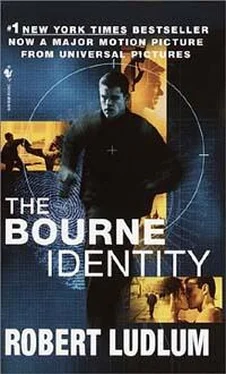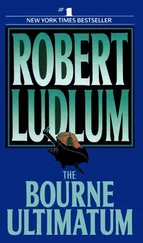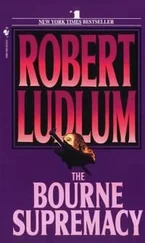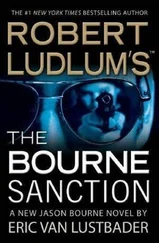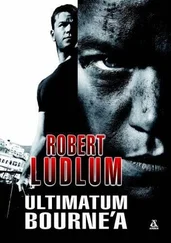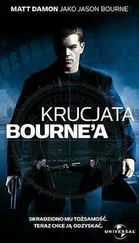Eighty-six logicals had been called, the word Treadstone mentioned; none had responded. Then the director went back to the possibles; there was an army man he had not considered because of his well-known antipathy to the CIA. But Conklin had telephoned him twice during the space of twelve minutes a week ago. The director called his sources at the Pentagon and found what he was looking for: Medusa.
Brigadier General Irwin Arthur Crawford, current ranking officer in charge of Army Intelligence data banks, former commander, Saigon, attached to covert operations—still classified. Medusa.
The director picked up the conference room phone, it bypassed the switchboard. He dialed the brigadier’s home in Fairfax, and on the fourth ring, Crawford answered. The State Department man identified himself and asked if the general cared to return a call to State and be put through for verification.
“Why would I want to do that?”
“It concerns a matter that comes under the heading of Treadstone.”
“I’ll call you back.”
He did so in eighteen seconds, and within the next two minutes the director had delivered the outlines of State’s information.
“There’s nothing there we don’t know about,” said the brigadier. “There’s been a control committee on this from the beginning, the Oval Office given a preliminary summation within a week of the inauguration. Our objective warranted the procedures, you may be assured of that.”
“I’m willing to be convinced,” replied the man from State. “Is this related to that business in New York a week ago? Elliot Stevens—that Major Webb and David Abbott? Where the circumstances were, shall we say, considerably altered?”
“You were aware of the alterations?”
“I’m the head of Cons-Op, General.”
“Yes, you would be … Stevens wasn’t married; the rest understood. Robbery and homicide were preferable. The answer is affirmative.”
“I see … Your man Bourne flew into New York yesterday morning.”
“I know. We know—that is Conklin and myself. We’re the inheritors.”
“You’ve been in touch with Conklin?”
“I last spoke to him around one o’clock in the afternoon. Unlogged. He insisted on it, frankly.”
“He’s checked out of Langley. There’s no number where he can be reached.”
“I know that, too. Don’t try. With all due respect, tell the Secretary to back away. You back away. Don’t get involved.”
“We are involved, General. We’re flying over the Canadian woman by diplomatic.”
“For God’s sake, why?”
“We were forced to; she forced us to.”
“Then keep her in isolation. You’ve got to! She’s our resolve, we’ll be responsible.”
“I think you’d better explain.”
“We’re dealing with an insane man. A multiple schizophrenic. He’s a walking firing squad; he could kill a dozen innocent people with one outburst, one explosion in his own head, and he wouldn’t know why.”
“How do you know?”
“Because he’s already killed. That massacre in New York—it was him. He killed Stevens, the Monk, Webb—above all, Webb—and two others you never heard of. We understand now. He wasn’t responsible, but that can’t change anything. Leave him to us. To Conklin.”
“Bourne?”
“Yes. We have proof. Prints. They were confirmed by the Bureau. It was him.”
“Your man would leave prints?”
“He did.”
“He couldn’t have,” said the man from State finally.
“What?”
‘Tell me, where did you come up with the conclusion of insanity? This multiple schizophrenia or whatever the hell you call it.”
“Conklin spoke to a psychiatrist—one of the best—an authority on stress-breakdowns. Alex described the history—and it was brutal. The doctor confirmed our suspicions, Conklin’s suspicions.”
“He confirmed them?” asked the director, stunned.
“Yes.”
“Based on what Conklin said? On what he thought he knew?”
“There’s no other explanation. Leave him to us. He’s our problem.”
“You’re a damn fool, General. You should have stuck to your data banks or maybe more primitive artillery.”
“I resent that.”
“Resent it all you like. If you’ve done what I think you’ve done, you may not have anything left but resentment.”
“Explain that,” said Crawford harshly.
“You’re not dealing with a madman, or with insanity, or with any goddamned multiple schizophrenia—which I doubt you know any more about than I do. You’re dealing with an amnesiac, a man who’s been trying for months to find out who he is and where he comes from. And from a telephone tape we’ve got over here, we gather he tried to tell you—tried to tell Conklin, but Conklin wouldn’t listen. None of you would listen … You sent a man out in deep cover for three years—three years—to pull in Carlos, and when the strategy broke, you assumed the worst.”
“Amnesia? … No, you’re wrong! I spoke to Conklin; he did listen. You don’t understand; we both knew—”
“I don’t want to hear his name!” broke in the director of Consular Operations.
The general paused. “We both knew … Bourne … years ago. I think you know from where; you read the name off to me. He was the strangest man I ever met, as close to being paranoid as anyone in that outfit. He undertook missions—risks—no sane man would accept. Yet he never asked for anything. He was filled with so much hate.”
“And that made him a candidate for a psychiatric ward ten years later?”
“Seven years,” corrected Crawford. “I tried to prevent his selection in Treadstone. But the Monk said he was the best. I couldn’t argue with that, not in terms of expertise. But I made my objections known. He was psychologically a borderline case; we knew why. I was proven right I stand on that.”
“You’re not going to stand on anything, General. You’re going to fall right on your iron ass. Because the Monk was right. Your man is the best, with or without a memory. He’s bringing in Carlos, delivering him right to your goddamn front door. That is, he’s bringing him in unless you kill Bourne first.” Crawford’s low, sharp intake of breath was precisely what the director was afraid he might hear. He continued. “You can’t reach Conklin, can you?” he asked.
“No.”
“He’s gone under, hasn’t he? Made his own arrangements, payments funneled through third and fourth parties unknown to each other, the source untraceable, all connections to the Agency and Treadstone obliterated. And by now there are photographs in the hands of men Conklin doesn’t know, wouldn’t recognize if they held him up. Don’t talk to me about firing squads. Yours is in place, but you can’t see it—you don’t know where it is. But it’s Prepared—a half a dozen rifles ready to fire when the condemned man comes into view. Am I reading the scenario?”
“You don’t expect me to answer that,” said Crawford.
“You don’t have to. This is Consular Operations; I’ve been there before. But you were right about one thing. This is your problem; its right back in your court. We’re not going to be touched by you. That’s my recommendation to the Secretary. The State Department can’t afford to know who you are. Consider this call unlogged.”
“Understood.”
“I’m sorry,” said the director, meaning it, hearing the futility in the general’s voice. “It all blows up sometimes.”
“Yes. We learned that in Medusa. What are you going to do with the girl?”
“We don’t even know what we’re going to do with you yet.”
“That’s easy. Eisenhower at the summit: ‘What U-Twos?’ We’ll go along; no preliminary summation. Nothing. We can get the girl off the Zurich books.”
Читать дальше
